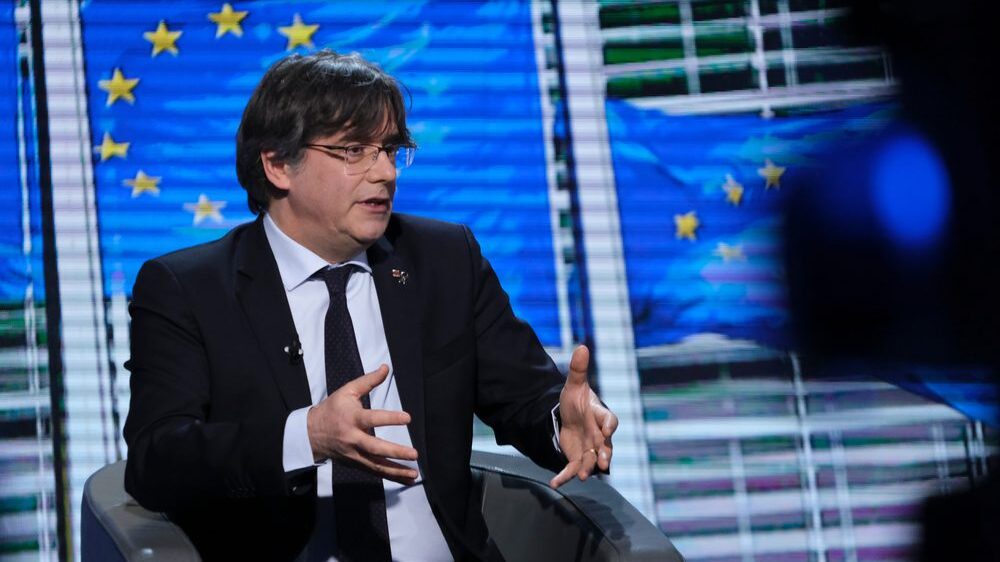
Photo: Alexandros Michailidis / Shutterstock.com
Three Catalan pro-Independence MEPs are facing the growing prospect of deportation to Spain on corruption charges following a decision by the EU’s General Court to remove their parliamentary immunity this week.
Self-styled Catalan President-in-exile Carles Puigdemont and two other MEPs from his Together for Catalonia party (Junts per Catalunya), Toni Comín and Clara Ponsatí, lost their immunity on Wednesday, July 5th after the EU’s General Court upheld a request by Spanish authorities to deport the parliamentarians in relation to the botched 2017 Catalan independence referendum.
Under EU law, MEPs are protected from prosecution to prevent intimidation from national governments. Puigdemont said that he and his colleagues would challenge this week’s ruling at the EU’s Court of Justice and that he wasn’t any closer to being deported to Spain than he was the week before.
🎥 Spanish justice minister Pilar Llop expressed "satisfaction" after the EGC decision on Puigdemont's immunity
— Catalan News (@catalannews) July 5, 2023
"Puigdemont must now present himself before the Spanish courts," she added. "That is his obligation as a Spanish citizen."
More: https://t.co/0vFZ3OS7G8 pic.twitter.com/vghEyx9M8g
Catalan separatists established a government-in-exile in Brussels shortly after their failed 2017 referendum was not recognised by the Madrid government. Initially facing charges of sedition, the separatists’ charges were downgraded by Spain’s socialist government to embezzlement and disobedience as the Spanish Supreme Court requested their extradition back to Spain.
This week’s court decision is just the latest in a six-year-long cat-and-mouse game between the EU, Catalan nationalists, and various Spanish governments. The process has posed fundamental questions about the role of the EU in mediating national disputes and political repression within member states.
In a press conference after the ruling, Puigdemont noted how senior EU officials, including recently deceased President of the European Parliament David Sassoli attempted to sabotage attempts to maintain the immunity of MEPs. At the same time, multiple anti-independence Spanish MEPs congratulated the Court.
Spanish authorities issued an EU arrest warrant in 2017 against Puigdemont and other separatist figures in a diplomatic spat that has stressed EU solidarity and the willingness to comply with what many progressives believe to be heavy-handed tactics by the Spanish state.
The issuing of a new arrest warrant by Spanish authorities is dependent on the outcome of the appeal by the Catalan MEPs and could reignite the Catalan issue right as the Spanish Presidency of the EU Council begins. The situation could also be complicated by elections in Spain next month which could see the formation of a new right-wing government including the nationalist VOX Party, intensely hostile to separatists.
One of the MEPs in question, Clara Ponsatí, had her immunity removed in 2021 before having it temporarily restored by the European Court of Justice earlier this year with uncertainty about how the Belgian authorities would respond to a request to deport the separatists.
Both Spanish intelligence officials and VOX MEPs have pointed to alleged links between Catalan nationalists and both the Soros Open Society and the Kremlin as they allege that separatists are attempting to orchestrate a second referendum attempt. Elements of the Spanish deep state are famously antagonistic to the Catalan cause: a bugging scandal of nationalist figures involving Pegasus spyware gripped Spanish politics the past year.
The question of Catalan sovereignty and the Spanish government’s antagonism to any European form of separatism is likely to throw a spanner in the works of the Scottish government. The Scots are currently cultivating a post-Brexit relationship with the EU, as Scottish leader Humza Yousaf visited Brussels last month for talks.
